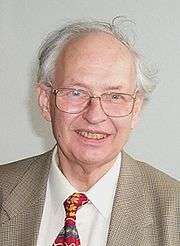Reinhard Selten
| Reinhard Selten | |
|---|---|
|
Reinhard Selten, 2001 | |
| Born |
Reinhard Justus Reginald Selten 5 October 1930 Breslau, Weimar Germany (modern Wrocław, Poland) |
| Died |
23 August 2016 (aged 85) Poznań, Poland |
| Nationality | German |
| Fields | Economics |
| Institutions | University of Bonn |
| Alma mater | Goethe University Frankfurt |
| Doctoral advisor |
Ewald Burger Wolfgang Franz |
| Known for | Game theory |
| Influenced |
Axel Ockenfels Benny Moldovanu Abdolkarim Sadrieh[1] |
| Notable awards | Nobel Memorial Prize in Economic Sciences (1994) |
Reinhard Justus Reginald Selten (5 October 1930 – 23 August 2016) was a German economist, who won the 1994 Nobel Memorial Prize in Economic Sciences (shared with John Harsanyi and John Nash). He is also well known for his work in bounded rationality, and can be considered as one of the founding fathers of experimental economics.
Biography
Selten was born in Breslau (Wrocław) in Lower Silesia, now in Poland, to a Jewish father, Adolf Selten (blind bookseller; d. 1942[1][2]), and Protestant mother, Käthe Luther.[2][3] Reinhard Selten was raised as Protestant.[3]
After a brief family exile in Saxony and Austria, Selten returned to Hesse, Germany after the war and in high school read an article in Fortune magazine about game theory by the business writer John D. McDonald. He recalled later, would occupy his "mind with problems of elementary geometry and algebra” while walking back and forth to school during that time.[1][2] He studied mathematics at Goethe University Frankfurt and obtained his diploma in 1957. He then worked as scientific assistant to Heinz Sauermann until 1967. In 1959, he married with Elisabeth Lang Reiner. They had no children. In 1961 he also received his doctorate in Frankfurt in mathematics with a thesis on the evaluation of n-person games.
He was a visiting professor at Berkeley, and taught from 1969 to 1972 at the Free University of Berlin and from 1972 to 1984 at the University of Bielefeld. He then accepted a professorship at the University of Bonn. There he built the BonnEconLab, a laboratory for experimental economic research, on which he has been active even after his retirement.
Selten was professor emeritus at the University of Bonn, Germany, and held several honorary doctoral degrees. He had been an Esperantist since 1959,[3] and met his wife through the Esperanto movement.[4] He was a member and co-founder of the International Academy of Sciences San Marino.
For the 2009 European Parliament election, he was the top candidate for the German wing of Europe – Democracy – Esperanto.[5]
Work
For his work in game theory, Selten won the 1994 Nobel Memorial Prize in Economic Sciences (shared with John Harsanyi and John Nash). Selten was Germany’s first and, at the time of his death, only Nobel winner for economics.[1]
He is also well known for his work in bounded rationality, and can be considered as one of the founding fathers of experimental economics. With Gerd Gigerenzer he edited a volume “Bounded rationality: The adaptive toolbox”.He developed an example of a game called Selten's Horse because of its extensive form representation. His last work was “Impulse Balance Theory and its Extension by an Additional Criterion”.
He is noted for his publishing in non-refereed journals to avoid being forced to make unwanted changes to his work.[6]
Bibliography
- Preispolitik der Mehrproduktenunternehmung in der statischen Theorie, Berlin-Heidelberg-New York: Springer-Verlag. (1970) – in German
- General Equilibrium with Price-Making Firms (with Thomas Marschak), Lecture Notes in Economics and Mathematical Systems, Berlin-Heidelberg-New York: Springer-Verlag. (1974)
- A General Theory of Equilibrium Selection in Games (with John C. Harsanyi), Cambridge, MA: MIT-Press. (1988)
- Models of Strategic Rationality, Theory and Decision Library, Series C: Game Theory, Mathematical Programming and Operations Research, Dordrecht-Boston-London: Kluwer Academic Publishers. (1988)
- Enkonduko en la Teorion de Lingvaj Ludoj – Ĉu mi lernu Esperanton? (with Jonathan Pool), Berlin-Paderborn: Akademia Libroservo, Institut für Kybernetik. (1995) – in Esperanto
- Game Theory and Economic Behavior: Selected Essays, 2. vol Cheltenham-Northampton: Edward Elgar Publishing. (1999)
- New edition of: Models of Strategic Rationality (1988), with a Chinese Introduction. Outstanding Academic Works on Economics by Nobel Prize Winners. Dordrecht-Boston-London: Kluwer Academic Publishers. (2000)
- Chinese Translation of: Models of Strategic Rationality (1988). Outstanding Academic Works on Economics by Nobel Prize Winners. Dordrecht-Boston-London: Kluwer Academic Publishers. (2000)
- Russian Translation of: A General Theory of Equilibrium Selection in Games (with John C. Harsanyi), Cambridge, MA: MIT-Press. (2000)
- Gigerenzer, G., & Selten, R. (Eds.). (2001). Bounded rationality: The adaptive toolbox. Cambridge, MA: MIT Press.
- Impulse Balance Theory and its Extension by an Additional Criterion. BoD. (2015)
See also
References
- 1 2 3 4 Roberts, Sam, "Reinhard Selten, Whose Strides in Game Theory Led to a Nobel, Dies at 85", New York Times, September 2, 2016. Retrieved 2016-09-03.
- 1 2 3 O'Connor, J J, and E F Robertson, "Reinhard Selten", www-history.mcs.st-and.ac.uk, November 2010. Retrieved 2016-09-03.
- 1 2 3 From Les Prix Nobel. The Nobel Prizes 1994, Editor Tore Frängsmyr, [Nobel Foundation], Stockholm, 1995
- ↑ Lins, Ulrich & Ertl, István. "Intervjuo kun Reinhard Selten, Nobelpreemiito" Esperanto (n° 1065-12, December 1994, p. 203
- ↑ Eŭropo – Demokratio – Esperanto: Germanio.
- ↑ Frey, Bruno S., "Publishing as prostitution? – Choosing between one’s own ideas and academic success", bsfrey.ch p. 215 (11).
External links
| Wikiquote has quotations related to: Reinhard Selten |
- Laboratory for Experimental Economics, at the University of Bonn, Germany
- Reinhard Selten – Autobiography
- IDEAS/RePEc
- Reinhard Selten at the Mathematics Genealogy Project
- Economista alemán, nacido en Breslau (actualmente Wroclaw, en Polonia).
- Reinhard Selten (1930– ). The Concise Encyclopedia of Economics. Library of Economics and Liberty (2nd ed.). Liberty Fund. 2008.

